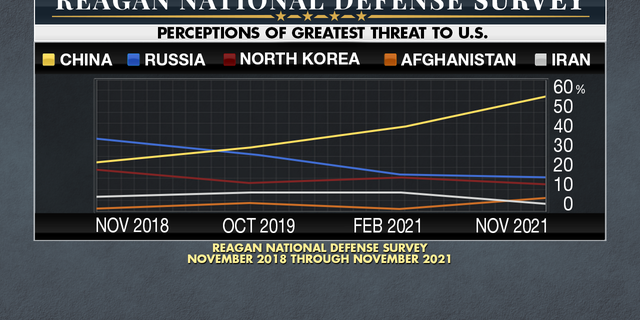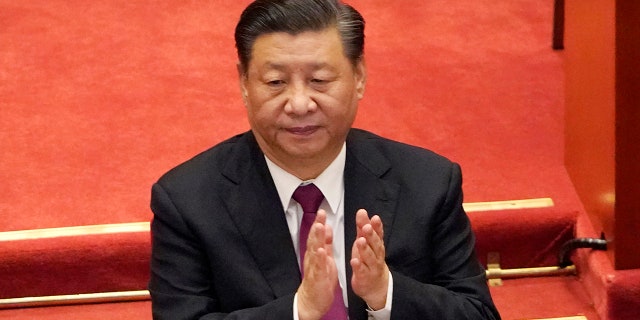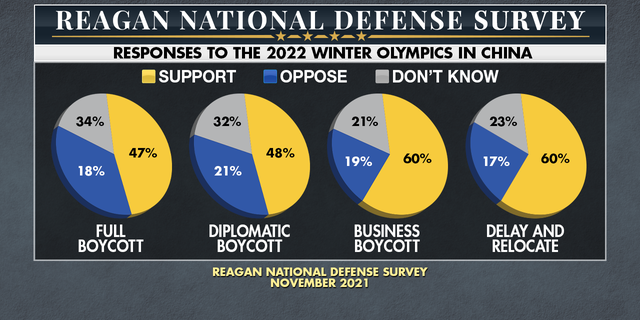Majority of Americans see China as top threat, concerned about war breaking out: poll
Biden, predecessors have not used ‘full extent of leverage over China’: Asia analyst on rising US-China tensions
Gordon Chang, author of The Coming Collapse of China, argues President Biden and his predecessors’ decisions have caused Beijing to do things that ‘people around the world don’t like.’
FIRST ON FOX – Most Americans view China, not Russia or any other country, as the top threat currently facing the U.S., with the majorities of those from both parties being worried about the possibility of the two nations going to war, according to a new poll released by the Ronald Reagan Institute.
The polling was conducted for this year’s Reagan National Defense Survey, with the institute comparing the results with how Americans viewed a variety of issues in 2018.
“For the first time in our survey, a majority of the American people identify a single country as the greatest threat facing the United States: China. Fifty-two percent of Americans name China when asked which country they see as the greatest threat to the United States, while only 14% say Russia,” the institute’s report said.
In contrast, only 21% viewed China as the top threat in 2018, when 30% had said Russia. In 2021, China was in front for members of both parties, as 44% of Democrats saw it as the biggest threat, with 64% of Republicans saying the same. For Democrats this is a sharp spike, as just 20% of respondents from the party named China as the greatest threat in February of this year.
Chinese President Xi Jinping applauds during the closing session of the Chinese People’s Political Consultative Conference (CPPCC) at the Great Hall of the People in Beijing, Wednesday, March 10, 2021.
(AP Photo/Mark Schiefelbein)
“Americans are also beginning to recognize the multifaceted nature of the China challenge,” the institute’s report said, pointing to a fairly even split when it comes to what people viewed as the greatest concern regarding China. Of those participating in the poll, 20% said China’s trade and economic practices, 19% said its development of its military, and 17% said human rights abuses.
Democrats and Republicans alike had the economic factor as their number-one cause for concern, with Republicans having the military as their second and Democrats saying human rights abuses.
Those worries go hand in hand with fear of a potential military conflict between the U.S. and China, as 71% of Americans said they were concerned about a possible war. That fear was shared by a majority of participants from both parties, as 66% of Democrats agreed with this, as did 79% of Republicans.
Freshmen attend a military training at Nantong Vocational University on Nov. 3, 2021, in Nantong, Jiangsu Province of China.
(Xu Peiqin/VCG via Getty Images)
Recently, a former Reagan administration official, Michael Sekora, told Fox News that he believes the U.S. will not be able to catch up to China technologically, no matter how much money is poured into research and development, until the Biden administration adopts a different national technology strategy. Currently, he said, the U.S. employs finance-based planning, which he said boils down to, “We are going to spend more money than they are.”
“Which is exactly what China wants,” Sekora said.
Instead, the former Defense Intelligence Agency official said the U.S. must utilize technology-based planning, which countries like China, Russia, Japan and India have used to grow at tremendous rates.
House Armed Services Committee ranking member Rep. Mike Rogers, R-Ala., agreed, telling Fox News that a technology-based strategy is key for improving defense, while finance-based planning can hinder progress.
“Technology-driven decision-making is an essential part of our defense modernization. Current incentives in the Pentagon lead to less innovation and more bureaucracy,” Rogers said. “Even a single failed test of a new technology can have serious consequences on officers’ careers. This attitude smothers innovation and reinforces using the same old ‘proven’ technologies that don’t meet modern threats.”
Ahead of the Winter Olympics, a majority called for a business boycott of China, by which U.S. businesses would refrain from sponsorships or advertising. Nearly half – 47% – supported a full boycott.
Source: Read Full Article








